Virtual Reality: Where It Began, By Lily Campbell, Award Nominated VR Director/Developer (YanksVR)
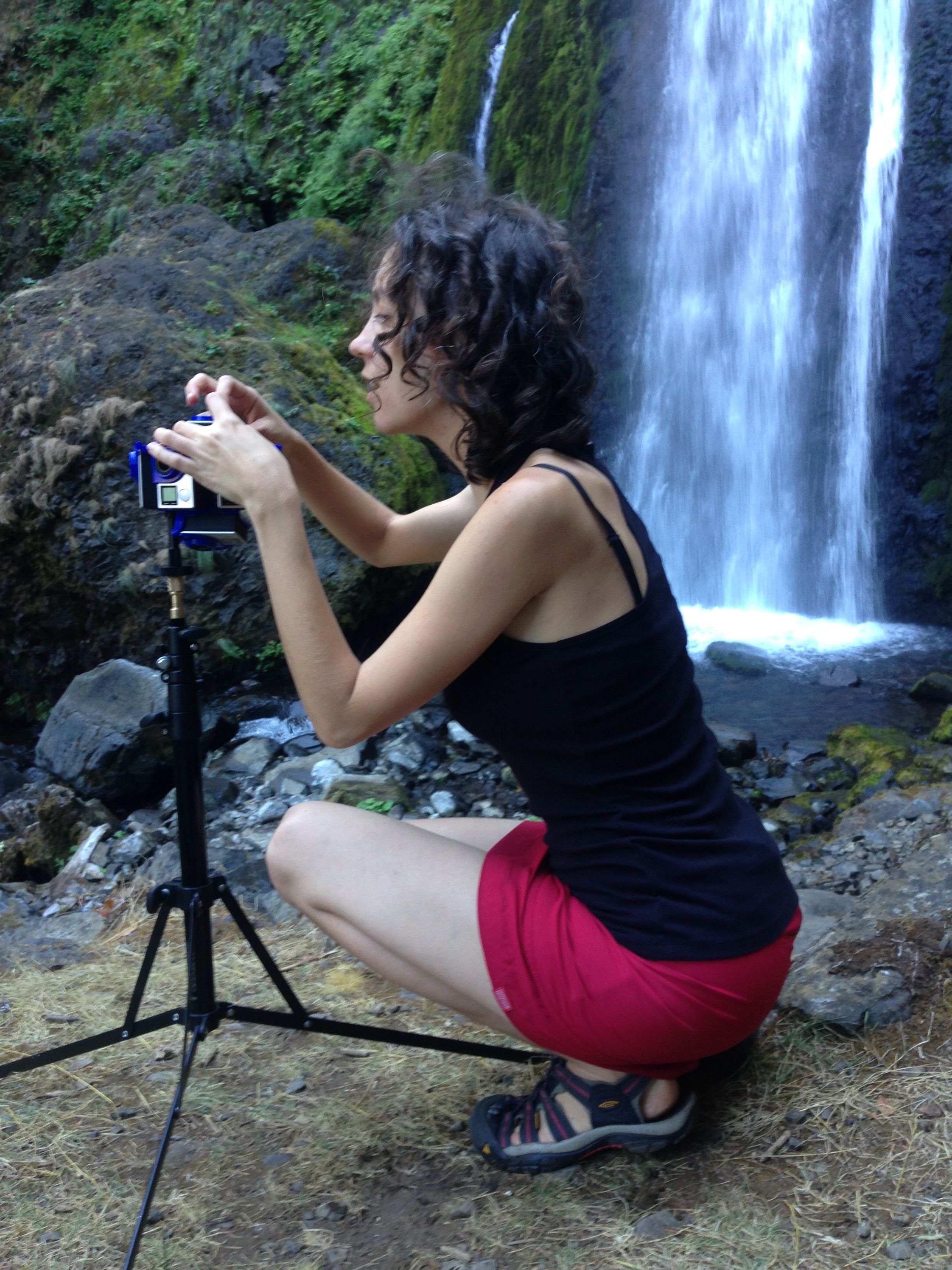
Me, testing out an early VR camera rig from 360Rize, which burned up $5k USD in GoPros.
I am a virtual reality developer, director and producer. I build VR camera rigs and have created content that has been nominated for multiple awards over the past few years. I enjoy musing on the tech and how we integrate into our lives. As technology develops for VR, our experiences become more and more immersive. However- simplistic 3D VR imaging could actually be said to have started almost 200 years ago.
Conceptually, “3D” imagery, the way we think about it (not holograms so much per se but screens presently), is simple to explain, if you don’t think too hard about it. There’s a lot that goes into it, but essentially, we attempt to trick our brains into perceiving a second set of images created to view the world as if it were “real” and from our own two eyes.
We visually perceive depth in the natural world largely because our eyes are set slightly apart, giving us two different perspectives from the same viewpoint. Our brain puts the two images together, which gives us the ability to see our surroundings as three dimensional (Stereopsis). Our world would look much different if we were all cyclopses and we were walking around with singular (mono) vision. We inherently view the world as three dimensional because we’ve evolved to utilize a sense of depth to our advantage. The ability to tell how far we are from anything around us is essential to our functioning. We naturally can see where we are in relation to our surroundings, because of depth perception. To us, the “real world” is depth, or three dimensional. So, when we view Virtual Reality content in 3D, it essentially can throw our brains through a minor loop. Where am I? What is real?
Stereoscopic imagery in VR is created by displaying two images that are meant to appear as being seen from a similar perspective as a pair of human eyes- slightly apart. So two images, one for each eye; mimicking our natural vision. This puts us in an artificial world of sorts, as our brain can perceive the set of images as “real”, though we logically know we are not physically there. We can feel transported visually to what feels like a “real” place- one that’s not where we know we physically are. So, simply put- it trips us out!
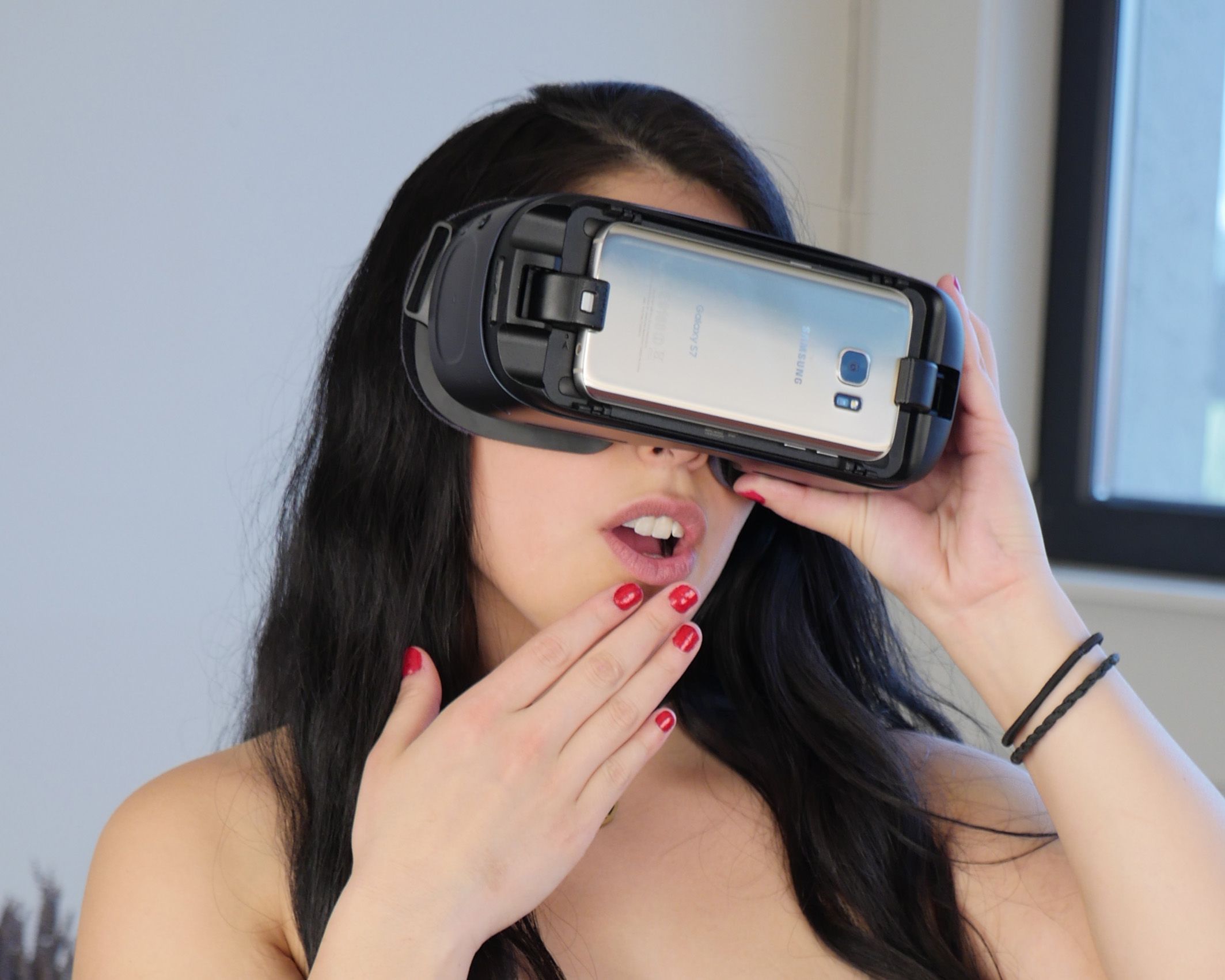
Catalina Rene at one of my YanksVR shoots. Obviously she's very surprised and not posed at all!
Simple stereoscopic imagery was created first in the 1800’s, with the earliest type of stereoscope (a device for viewing a stereoscopic pair of images) invented in 1838. It utilized drawings, as it was introduced shortly before the first practical photographic process became available.

Drawing of a Wheatstone Mirror Stereoscope, circa 1838
Stereoscopy (the production of these 3D illusions) developed alongside photography, with daguerreotypy (the first kind of publicly available photography) leading the way. In 1851, at the Great Exhibition in London, the introduction of stereoscopes was so well received that it birthed a new 3D industry practically overnight. The demand was so high that 250,000 stereoscopes, along with many more accompanying viewing cards (stereographs, stereo cards, stereoviews, stereo pairs) were quickly produced. Stereographers were deployed across the globe to capture new and exciting images for the captivated audiences.
I found this old stereoscope recently at The Fort Dalles Museum.
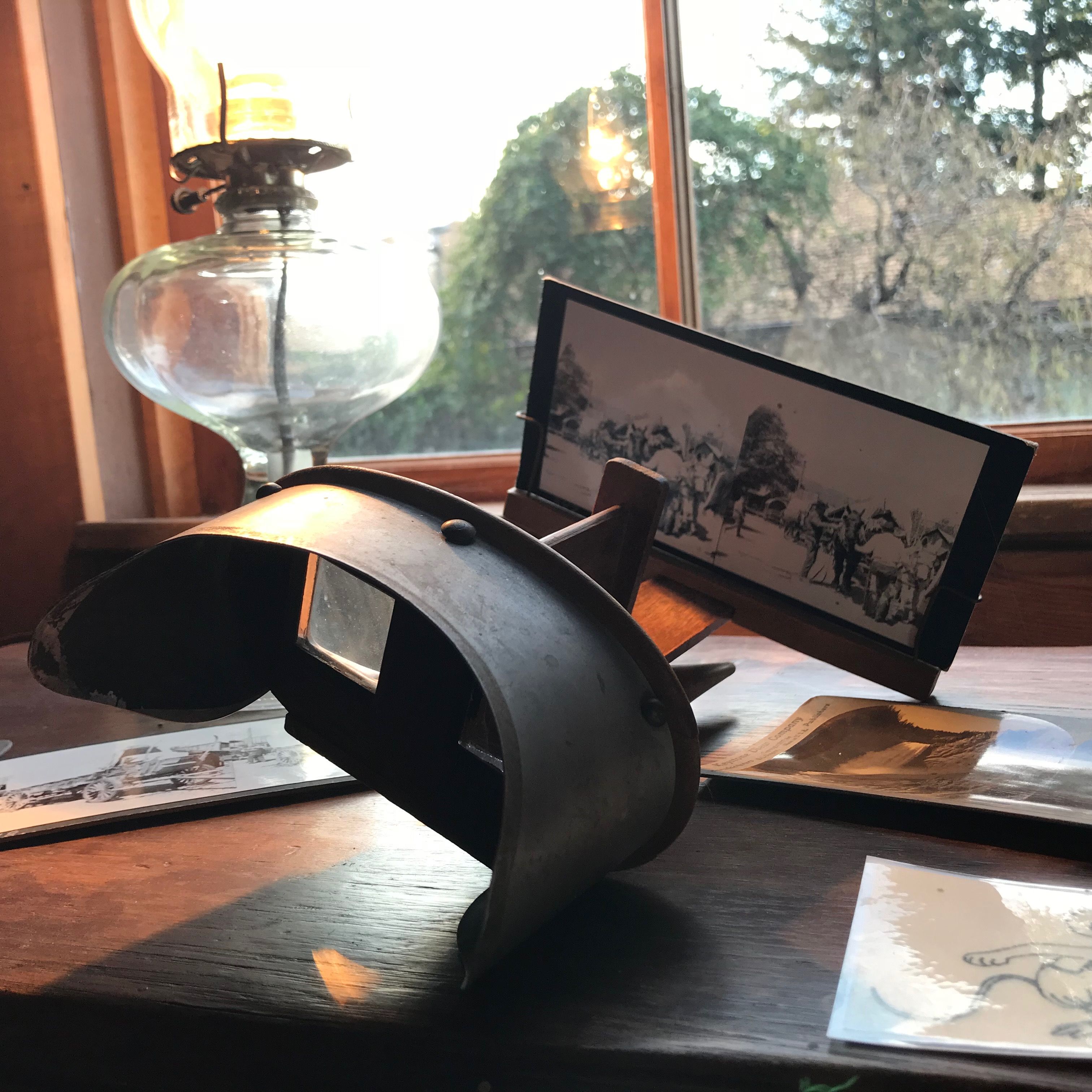
Along with several accompanying stereographs.
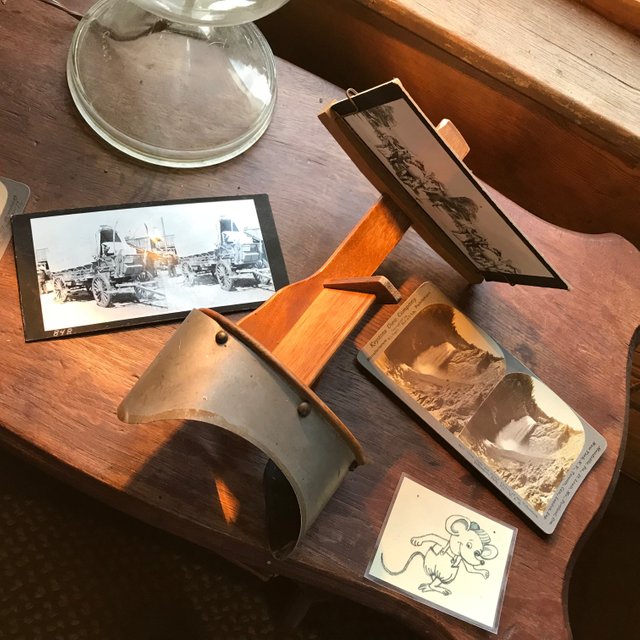
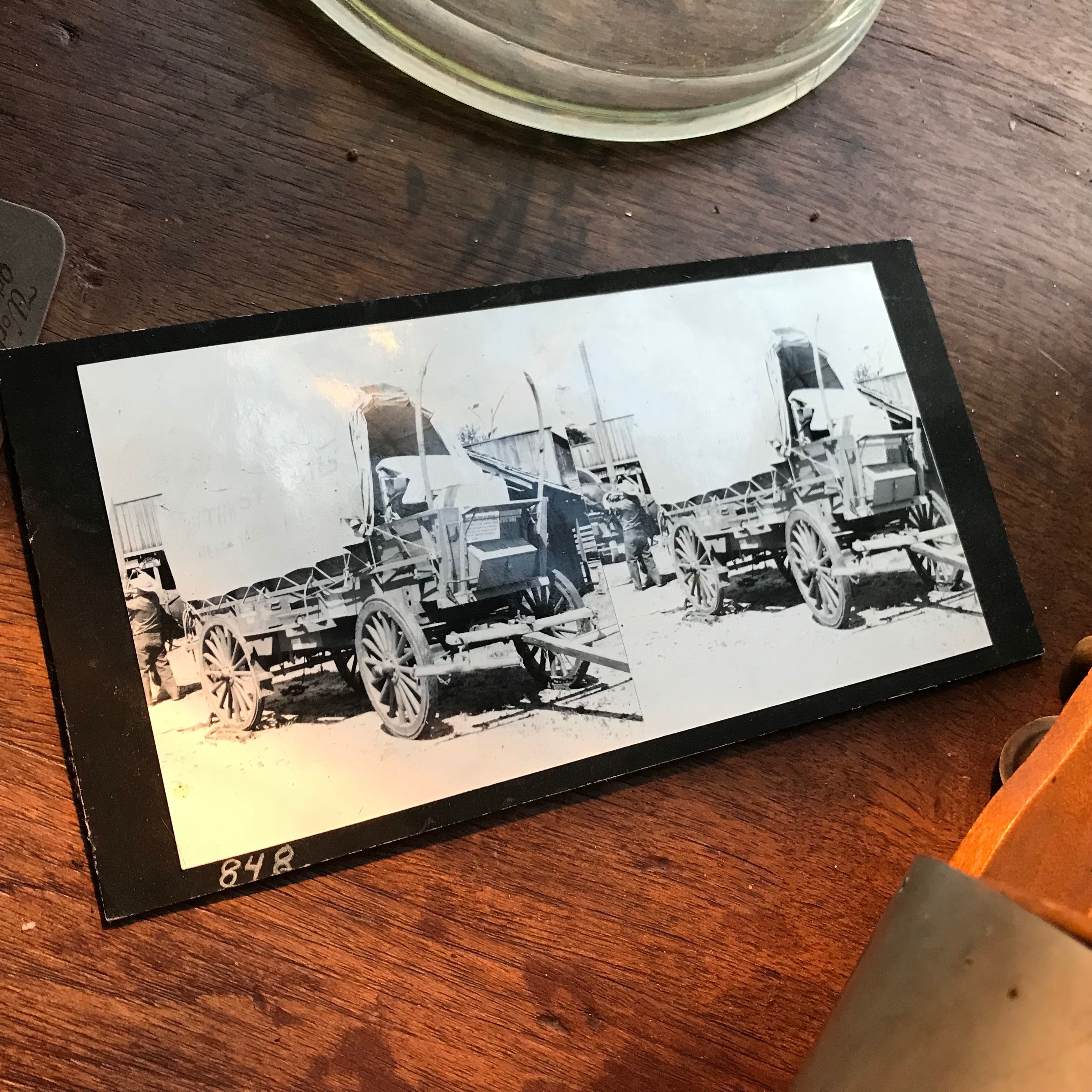
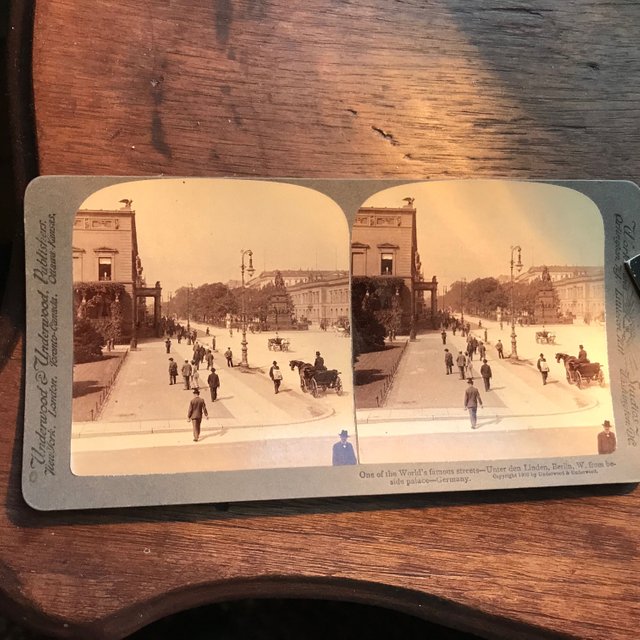
Another stereoscope I found on a recent trip to an antique store- it looked well-used/loved.
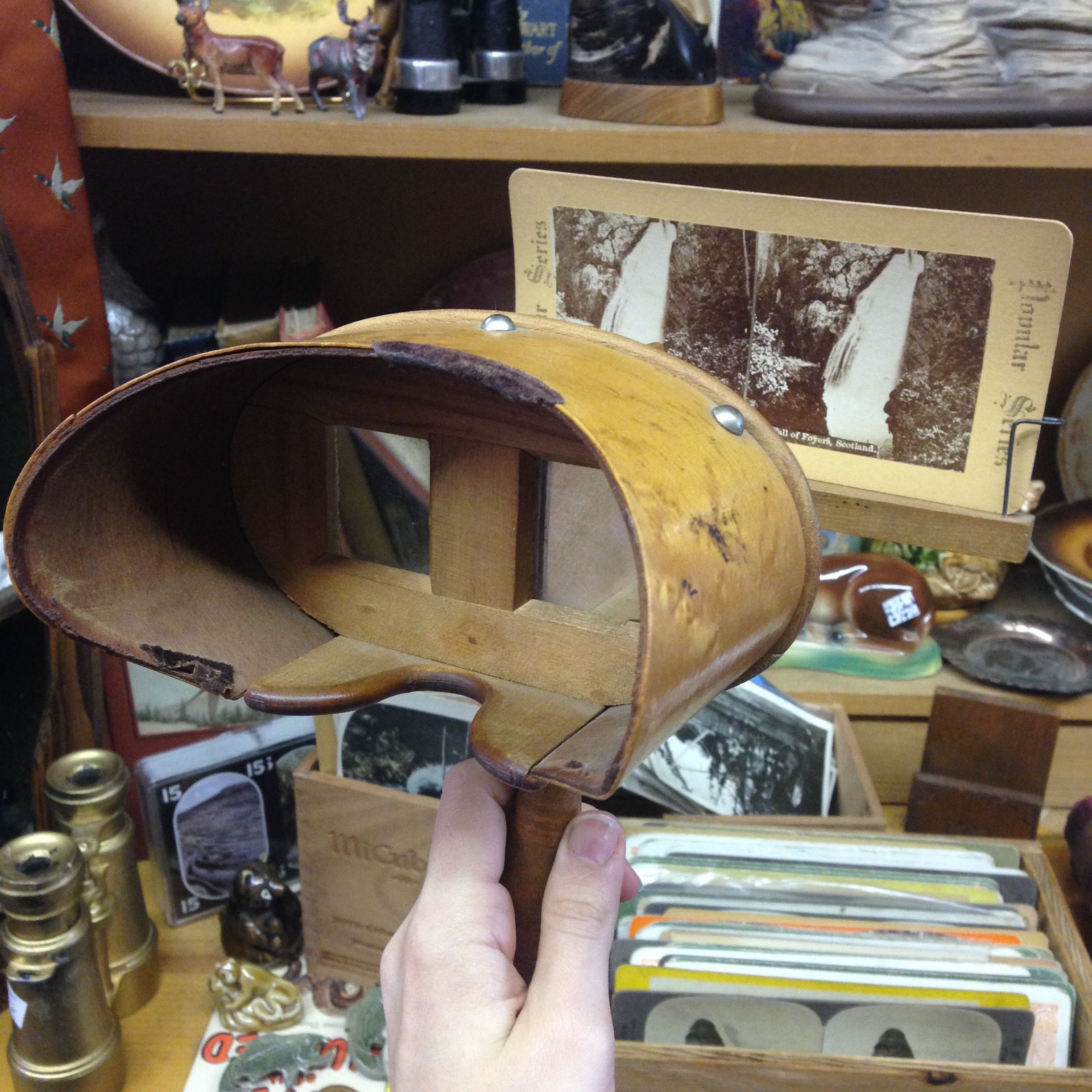
I enjoy looking at these old viewers as they remind me of the wonder that we can experience with new and "immersive" environments. These are simple compared to current VR imagery, but emerged out of much precision work, imagination, and great care. I know from my own personal experience, developing in VR for me has meant an immense amount of trial and error, from the rigs to creating protocol for filming and editing. It's incredible how quickly VR technology has grown in the last few years; when I started out, it was "figure it out for yourself!"
Virtual reality will, in one way or another, continue to amaze us as time goes on. I find the natural progression of our technological advancements fascinating, and I am lucky enough to have a front row seat.
-Lily Campbell
A personal note on VR funding and future development:
My work developing both VR camera rigs and content continues to be super interesting to me, but funding has stopped for me to devote as much time to it. I am entirely freelance now, so am considering where all to put my energy as I am also financially needing to live in the virtually real and immersive situation of living in the "real world" and paying "real rent"- so time will tell, in regards to being able to fund more serious time for development. I will do what I am able to, as I am passionate about it!
If you want to contribute to me/my work, it's more than welcomed!
- Crypto (whichever type!)
- Fiat (through Amazon/Buy Me A Coffee/Paypal/Venmo/etc)
- Pictures of puppies/kitties/small creatures
- Good/Bad jokes
- Commisseration/Optimism
Thanks much! Just let me know and I'll help you help me ;)


Love those old stereoscopes - great article Lily! Definitely interesting to see where we are heading and where we have come from. We are just scratching the tip of the VR iceberg :) Much love - Carl
We are definitely just scratching the tip of the VR iceberg! So many aspects of how we will function technologically (in life, outside of VR viewing) will soon have unseen aspects of the tech we are working with in VR. Thank you so much again for all your support @carlgnash!<3!
Yes very exciting times really, in many respects. And speaking of exciting :)
This post was nominated by a @curie curator to be featured in an upcoming Author Showcase post on the @curie blog. If you agree to be featured in this way, please reply and:
You can check out the previous week's Author Showcase to get an idea of what we are doing with these posts.
Cheers - Carl (@curie curator)
What?! Wow! Whoa, thank you!
Author showcase is up :)
https://steemit.com/curation/@curie/curie-author-showcase-march-22nd-2018
Thanks @carlgnash! :)
wow! great post Lily! love how you included pictures you took personally about the stereoscope and posted it here! i will be submitting this to Curie! thanks for sharing this post with us! :)
Thanks so much @andywong31!
Hey Lily
Those stereograms are cool. My master (@markangeltrueman) is hoping to get into VR soon. He just bought some new fandangled machine that he thinks is powerful enough to handle it. We shall see.
Congrats on the curie upvote. I have re-steemed this on the @steemsearch blog.
The Curator
Thank you @steemsearch- and please give your master @markangeltrueman my sincere appreciation too! Also please tell him to treat his computer with kindness- VR can be a massive ask for any machine to try to handle. A lot of patience is key.
Thanks so much for the @curie and for resteeming this!!
Congratulations @lilycampbell, this post is the third most rewarded post (based on pending payouts) in the last 12 hours written by a Newbie account holder (accounts that hold between 0.01 and 0.1 Mega Vests). The total number of posts by newbie account holders during this period was 4300 and the total pending payments to posts in this category was $2229.40. To see the full list of highest paid posts across all accounts categories, click here.
If you do not wish to receive these messages in future, please reply stop to this comment.
Nice picture!
You got an upvote, so it would be kind to follow this account for more upvotes in the future :)
Good steem lilycampbell.
I gived you a resteem.
Please have a look over this post: https://stееmit.com/@jericho7/2pdgeh and give me you feedback!I really want to know what do you think about the article!
Thanks lilycampbell!
As someone who was guilty of playing far too much World of Warcraft, I’m both excited about developments in VR and also worried about spending the 2020s glued to my computer. Looking forward to hearing about future developments.
Haha, it's completely valid to be both excited about VR developments and concerned that even more screentime could be in our society's future.
or present:)
I agree that across the board it's a bit intense on our amounts of screen time.
Look at you! rocking the CURIE!
Well done.
Remember us little people when you make it big.
Thanks- I am lucky!
Congrats! I am a senior 3D modeler and software developer. The vr research is still in its infancy and this is why I have never owned a proper VR solution. The software is sucky at best but I have seen some better developments.
What sort of apps did you create? Which one have you had the most fun with developing?
Hi @alexdory! Nice on 3D modeling and software dev! Haha yes infancy indeed compared where VR is going. Software especially perhaps. I haven't created my own apps yet. I have worked from scratch with hardware and camera rig building (including some 3D printing)/developing shooting protocol and working on creating the most naturalistic experience, within a happy marriage of hard and software... the learning curve has been uber steep, as it's been creating it as we go.
Very well. I will keep an eye on you (in a totally non-weird way).
I am curious what software you will develop once you get to that phase. The software will make it or break it as a future tech.
Remember Google Glasses? Nobody does :D
good point on google glass ;)
Being A SteemStem Member